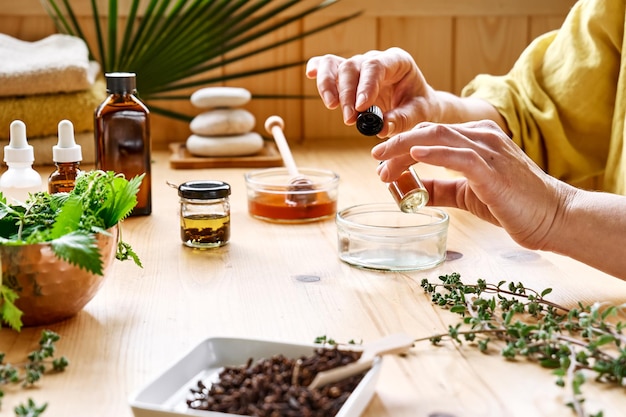Common Sore Throat Causes
There are many potential causes of a sore throat, with viruses being the most common. In fact, viruses account for about 95 percent of sore throats. Some common causes include allergies, dry air, pollution, smoking, exposure to people with a sore throat, cold, flu, strep throat (bacterial), tonsillitis, a weak immune system, and acid reflux.
Common Sore Throat Symptoms
Isn’t a sore throat truly a symptom itself? Yes, but as you probably already know, not all sore throats are the same and some are more severe than others. You might have one that only makes your voice a little hoarse, or it might be a serious impediment to your ability to breathe comfortably. Some of the most common symptoms of a sore throat are pain when swallowing, difficulty swallowing, a dry and itchy throat, swollen glands around the neck and throat, and a hoarse voice.
A sore throat is also a first symptom of the common cold and flu, but you might have other symptoms such as fever, runny nose, congestion, headache, abdominal pain, or vomiting. Consult your trusted healthcare provider if your sore throat lasts longer than one week.
Best Home Remedies for Sore Throat
Don’t worry; many home remedies can soothe a sore throat. Here are some of the best:
Drink Warm Fluids
If you have a cold, make sure you’re taking in plenty of fluids. Nothing feels better than warm tea and thin soup when you’re sick. When your throat is raw and inflamed, drinking warm beverages keeps your throat moist and comfortable. Black tea might be the obvious choice, but give green or oolong tea a chance if Earl Grey just isn’t your, well, cup of tea.
Gargle Salt Water
For fast relief from sore throat pain, gargle eight ounces of warm water with half a teaspoon of salt. You may have heard of this practice before and dismissed it as an old wives’ tale, but it does work and many people swear by it.
Use a Humidifier
If there’s anything that can make a sore throat even worse, it’s harsh, dry air. Use a humidifier to add moisture to the air around you. In one study, using a humidifier reduced the severity of sore throat pain. If you’re experiencing other symptoms like upper respiratory congestion, try adding an essential oil like eucalyptus oil to the humidifier to loosen and help expel excess mucus.
Raw Honey & Black Seed Oil
Honey may not be suitable for vegans. However, honey does offer many benefits. Add a teaspoon of raw honey to your tea, or take a spoonful by mouth to soothe your sore throat. As an added bonus, honey significantly improves cough symptoms. You can spike your honey with therapeutic spice by adding two to three drops of black cumin seed oil (also called black seed oil) to your honey. Like herbal teas, black cumin seed oil is an anti-inflammatory and can help soothe the pain.
Cold Food
Drinking or eating something cold soothes an irritated throat almost immediately. Instead of ice cream or ice pops, opt for whole fruit sorbet or make your own fruit pops to soothe the irritation.
Herbal Tea
Many varieties of herbal tea are effective at soothing a sore throat. Chamomile, lavender, echinacea, sage, ginger, peppermint, and licorice root tea all have antioxidant and anti-inflammatory effects. Peppermint, in particular, relieves upper respiratory congestion by improving lung function and the ability to breathe through your nose. If you need to add a little sweetener, stir a teaspoon of honey or elderberry into your herbal tea. Love garlic? Try this garlic tea recipe.
Essential Oils: Lavender, Eucalyptus, & Myrrh
Myrrh and eucalyptus are effective for soothing a sore throat but don’t take them as a tea. Instead, inhale the vapors by using a diffuser or humidifier. You can also gargle with myrrh like a mouthwash. Apply one or two drops of food-grade lavender oil, specifically and exclusively from the Lavandula angustifolia species, to the back of your tongue or throat to relieve the pain from a dry, scratchy throat. The taste isn’t overwhelming and the only side effect is fresh, floral-smelling breath.
Spices: Cayenne, Turmeric, Ginger, & Clove
Cayenne might seem counterintuitive for a sore throat but, after the burn, it provides relief by numbing the pain. To make, add one tablespoon of cayenne pepper to a quarter cup of warm water. Mix in the cayenne completely, take a mouthful, tilt your head back, and gargle. If you can’t handle a lot of spice, this might not be the best solution. Turmeric and ginger both have long histories as therapeutic plants. Drinking ginger juice alleviates sore throat pain. You can also make a tea with fresh ginger. Turmeric contains curcumin, which is very soothing. You can make a turmeric gargle to soothe a sore throat, just like cayenne, but without the sting. Make a clove tea, clove calms inflammation and eases the discomfort associated with a sore throat.
Propolis
Propolis offers multiple health benefits, especially for those suffering from an upper respiratory infection. If you’ve never heard of it, propolis is made of plant material, beeswax, and, well, bee saliva. It is useful against most types of harmful organisms, even the flu virus. Take it by adding five drops of propolis to a teaspoon of water.
Honey & Elderberry
Honey with elderberry is my favorite combination and goes great with a few sprays of Global Healing’s Lung Health. Elderberry reduces the severity of the common cold and flu symptoms and may shorten the duration of the illness. Add a little elderberry syrup to your honey and stir into your tea or simply take it by mouth. If you use fresh elderberries, make sure to cook them thoroughly; raw elderberries are not safe to eat.
How to Prevent a Sore Throat
The best strategy is to avoid catching a sore throat in the first place. Reduce your chances by washing your hands and limiting your exposure to sick people. Avoid smoking and secondhand smoke, which may irritate your throat. Strengthen your immune system by eating cruciferous vegetables and carotenoid-rich tomatoes. For more tips, check out our How to Stay Healthy During the Winter article.
There are, of course, many types of lozenges, sprays, gargles, and, recently, pain strips but be careful with OTC medicine as it may have very real side effects. Conversely, most of the remedies described in this article do not have unpleasant side effects.
What home remedies do you use to soothe a sore throat? Tell us below!



